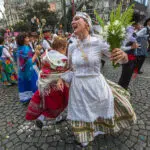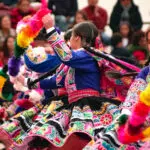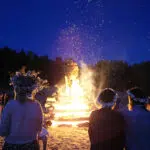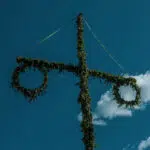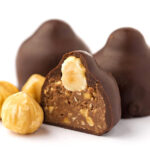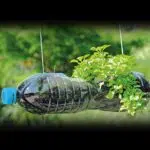Jani is an annual celebration in Latvia that takes place on June 24. It commemorates the summer solstice. It is a day that celebrates renewal, fertility, and hope of good luck, based on ancient folk traditions. On this day, Latvians partake in rituals that represent rebirth and new life. It is considered to be one of the most important celebrations in the Latvian calendar as many leave the cities to bask in the tranquility of the countryside.
History of Jani
Jani was originally an ancient fertility festival that was celebrated after sowing the crops and before gathering the harvest. Its origins date back far before Christianity and were mainly celebrated by pagan farmers. After Christianization, however, Jani was moved to coincide with St. John’s Day. It is the final day of the two-day midsummer celebrations which begin with the Ligo festival — Ligosvetki — and ends with Jani.
During Jani, Latvians gather in the countryside to celebrate with loved ones. One of the main festivities includes making bouquets and wreaths out of plants and wooden foliage. The wreaths themselves are mainstays of Jani, as every man, woman, and, in some cases, livestock adorn one in the spirit of the festival. Herbaceous plants such as cow wheat and bedstraw are mainly used as it is believed these herbs help protect one from plague and misfortune.
As per the tradition, have also light — and jump — over bonfires to welcome the coming sunrise and welcome fertility for their fields. Leaping over them is thought to bring good luck. Smorgasbords of cheese and meat are traditionally served in households, adding to the festive and lively atmosphere that the holiday provides.
For Latvians, Jani is considered to be the ‘longest night of the year,’ mainly because tradition dictates them to not sleep until sunrise. It is said that if one sleeps during the Midsummer night, they are ‘doomed to sleep the whole summer,’ which is another way of saying one will spend the rest of the year being lazy. During this nocturnal phase, celebrators are encouraged to talk with each other or walk through the morning dew. Doing so, they believe, will bring prosperity ahead.
During the Soviet era, the Soviet government banned any celebrations of Jani due to being seen as a nationalist holiday that contradicted the Soviet values of collectivism. After Latvia’s independence in 1990, Jani has since been reinstated and celebrated annually and is a holiday well anticipated by Latvians as it compels them to take time off and enjoy the countryside.
Jani timeline
Latvia is among the last European regions to be Christianized, as they joined the Catholic Church during this period.
Latvian industrialist Johann Steinhauer buys the village of Zakumuiza and begins the first herbal-themed celebrations for Jani.
Latvian composer Emilis Melngailis first coins the term ‘Ligosvetki.’
Latvia declares independence from the Soviet Union.
Jani FAQs
What are the best things tourists can do during Jani?
While celebrations also take place in the Latvian capital Riga, one can also venture out to the countryside to take in more authentic, rural celebrations. As a tourist, one can observe the traditions and festivities taking place, and can even join in!
Are Latvians indigenous?
Latvians are the country’s original inhabitants and have been so for over 4,000 years. Their language is also considered to be one of the oldest spoken in Europe.
Do they speak English in Latvia?
Generally, residents in Riga can speak English, but visitors might have difficulty finding English speakers in rural areas. Most of the younger generation under 40 tend to speak English more frequently than older residents.
Jani Activities
Light a bonfire and jump over it
Tradition compels one to light a bonfire all night long to symbolize the light being carried to the next day. Leaping over the bonfire is believed to bring one good luck for the year ahead. So, what are you waiting for? Get burning and get jumping!
Have your fill of cheese, meat, and beer
Aside from caraway cheese and meats, beer is traditionally consumed as part of the tradition. Doing so adds further liveliness to an already lively celebration. All the more reason to swig one down the hatch.
Celebrate with Latvian communities around the world
Latvians abroad usually celebrate Jani with diaspora communities. If you are a Latvian abroad, take part in these gatherings to feel closer to home. Jani can be celebrated anywhere, but the essence of it is doing so with fellow Latvians.
5 Fascinating Facts About Latvia
Latvia is a very green country
Over 48% of the country's territory is covered by forest, making it one of the greenest countries in Europe.
One-third of the population lives in Riga
Latvia's capital, Riga is home to 627,487 residents.
They do their talking on the ice
Like Canada and Russia, Latvia's national sport is ice hockey.
They have one of the oldest flags
The current Latvian flag has been in use since the 13th century.
Latvia is small but wide
Despite being one of the smallest countries in Europe, Latvia takes up 310 miles of the Baltic Sea coastline.
Why We Love Jani
It highlights the importance of Latvia's pagan roots to its people
Jani is a way for Latvians to honor their rich pagan history, and maintain the traditions that have existed long before Christianity came to the fore. It showcases the amount of respect that Latvians have for their ancient traditions and is a way for Latvians to embrace the uniqueness of their identity.
It encourages taking time off
The two-day celebrations of Ligo and Jani encourage Latvians to take a breather from their busy lives and focus on appreciating nature and their loved ones. Many go to the countryside during this time to soak up the tranquility and remind themselves that life is not just about work.
It’s a chance to start a new chapter
As with many Midsummer and New Year-themed celebrations, Jani is a time for renewal and cleansing for the new times ahead. It is a time when all burdens are shed, and fresh starts can be made. After all, facing the uncertain future is best done with a fresh mind.
Jani dates
| Year | Date | Day |
|---|---|---|
| 2026 | June 24 | Wednesday |
| 2027 | June 24 | Thursday |
| 2028 | June 24 | Saturday |
| 2029 | June 24 | Sunday |
| 2030 | June 24 | Monday |





